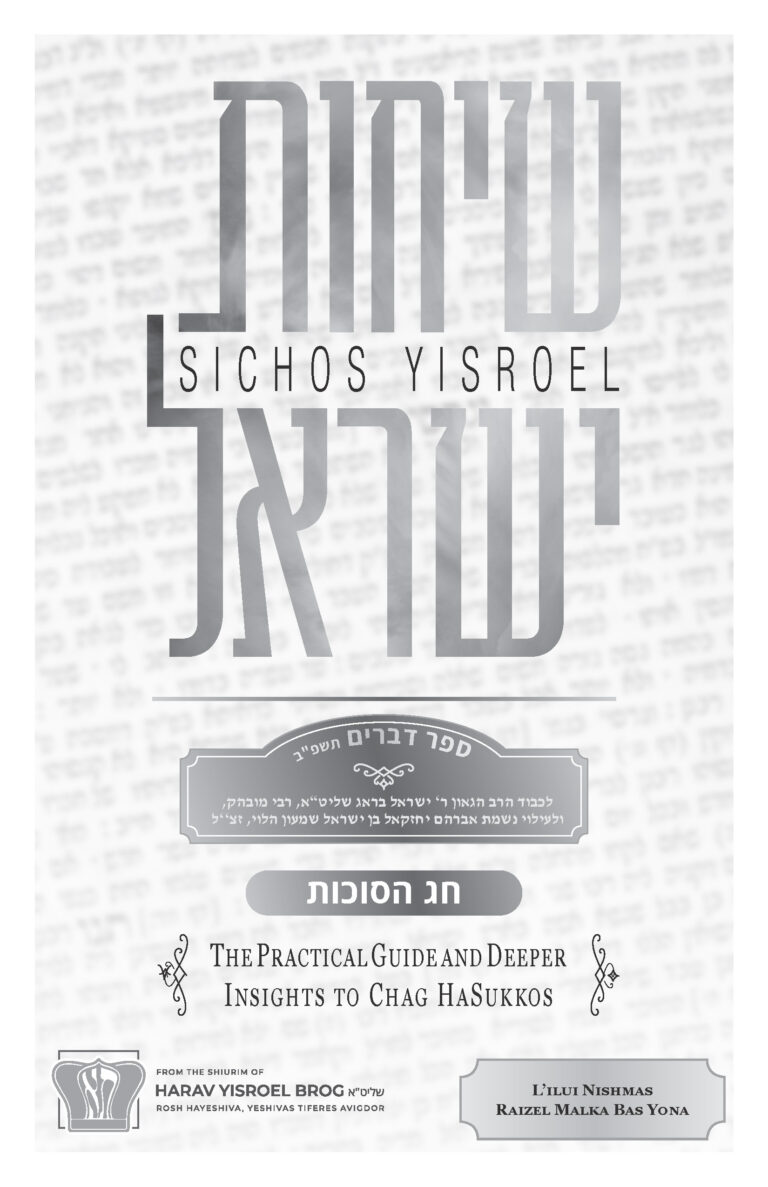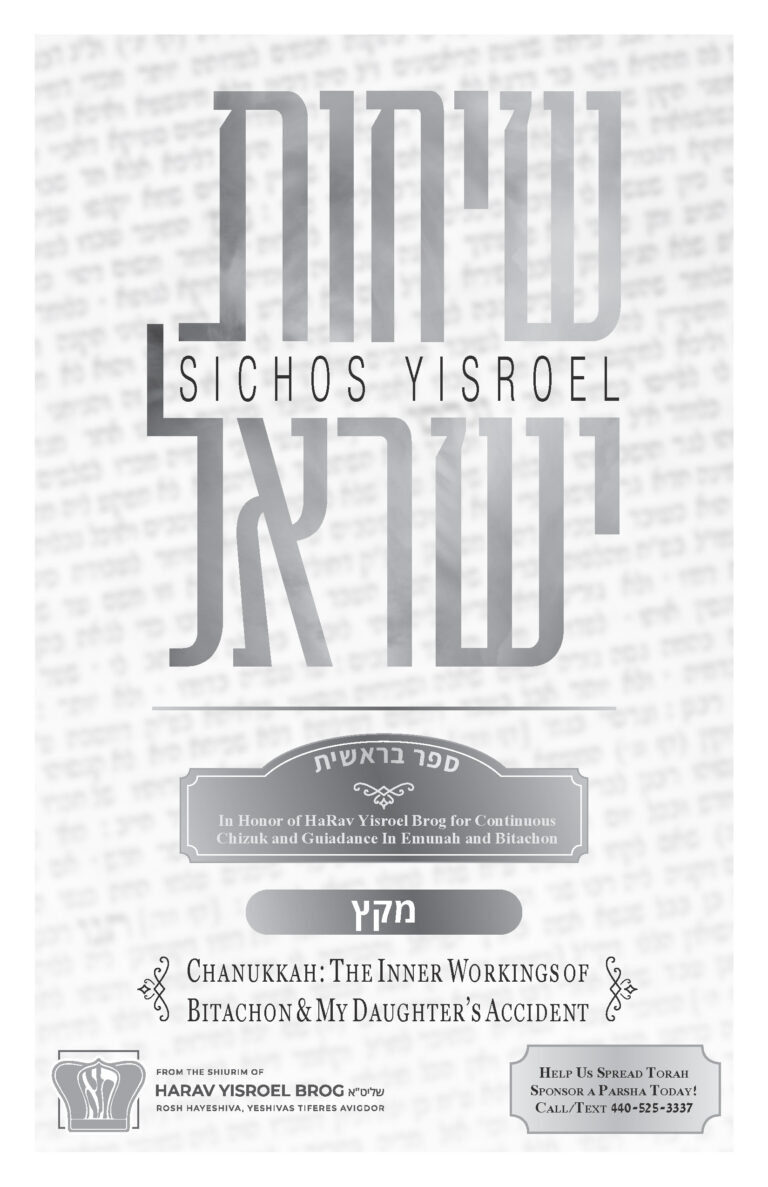Yisro 5784: Transform Your Learning and Tefillah With This!
Sponsored
לזכות רפואה שלמה
Yehuda (Leon) Ben Esther
&
לזכות זווג הגון for Moshe Ben Leon
Consider sponsoring a shiur
Visit YTATorah.org
Shiur presented in 5776
The Most Powerful Remedy
The subject we’d like to discuss today is an important one because many people pose the following question. The Torah says: בראתי יצר הרע בראתי תורה תבלין, I created an evil inclination, and I created Torah as its antidote (Kiddushin 30b). So that means to say that the antidote, the counterforce for the yetzer hara, is Torah. And as the Ramchal explains, all the chachamim, and all the “therapists” and all the “psychologists” and all the “psychiatrists” and all of Pharaoh’s advisors will come together and make suggestions of how to overcome the yetzer hara. But they’re not going to work because Hashem is the One who created the yetzer hara, and He says, “I also created the antidote. This is the only thing you can do to fight it.” That’s what the gemara says.
The question that everybody asks is, “Hello?! I’ve tried that before. My yetzer hara doesn’t seem to get tempered or diminished at all!” They say it doesn’t seem to work. Of course, this question is silly, and the people who come out with such a viewpoint are simply because they want a way to escape learning Torah. Many of them want to wallow in their yetzer hara. They say it doesn’t work. But when you want something, and you know this is the way to cure it, you do it! Let’s say you have a toothache, and your dentist says, “Try Tylenol.” So you go home, and you try Tylenol! Ok, let’s say the pain didn’t go away. So what do you say? You don’t say, “I guess Tylenol doesn’t work for me. I guess I’ll live with the toothache.” No. You know what you do? You go back to the drugstore and say, “Excuse me, Mr. Pharmacist. What you gave me last time, doesn’t work for me. Do you have anything stronger?” He tells you, “Ok, try ibuprofen. If that doesn’t work, come back. I have other stuff.” They try to sell you the whole store, and you keep coming back because you want to get rid of that toothache.
So if you honestly want to cure your yetzer hara, you’ve got to keep coming back and finding out what you’re doing wrong.
Do This Before You Learn
I will share with you something that my Rebbi zichrono levrachah, Rav Meir Halevi Soloveitchik, said. In this week’s parshah (Shemos 19:1), it says as follows: בחדש השלישי, it was the third month from when the Yidden left Mitzrayim. It was Rosh Chodesh Sivan. לצאת בני ישראל מארץ מצרים ביום הזה, on this day, באו מדבר סיני, they came to Midbar Sinai. The passuk says when they came to Midbar Sinai, where did they come from? It says ויסעו מרפידים, they came from the city called Refidim, ויבאו מדבר סיני, and they came to Sinai (ibid. 19:2).
Rashi quotes from the Chazal: Why does the passuk need to tell me where they came from?[i] It’s a repeat. We know it from an earlier passuk (Shemos 17:1).[ii] It says that the last place where they camped was Refidim. So why does it say again where they came from, especially after it tells me they arrived?!
Rashi says, אלא להקיש, it comes to give you a comparison. What’s the comparison? The Torah wants you to take a look and compare נסיעתן, their traveling from Refidim לביאתן למדבר סיני, to their arrival at Midbar Sinai. מה ביאתן למדבר סיני בתשובה, just like their arrival to Midbar Sinai was in a state of teshuvah, אף נסיעתן מרפידים, so, too, their coming from Refidin where they sinned and challenged Hashem, was also beteshuvah.
What needs to be understood here is where in the world does it say they arrived at Sinai in a state of teshuvah? Chazal are telling us that just like they arrived at Sinai in a state of teshuvah, it must be that they left Refidim in a state of teshuvah. But where does it say they arrived at Sinai in a state of teshuvah?
The Sifsei Chachamim and many of the commentators pose this question and they say that, since it says that Klal Yisrael was united, ויחן שם ישראל נגד ההר כאיש אחד בלב אחד, that’s something you can’t attain, without teshuvah. So perforce, there must have been teshuvah over here!
The Rebbi explained this puzzle. He said if you look in a very holy sefer Nefesh Hachaim ofRav Chaim Volozhiner, you see an amazing idea. (Incidentally, my Rebbi told me that when he was a young boy, his father – the Brisker Rav – told him that he should learn this sefer, from cover to cover and know it well. Everything you have to know is in this sefer. That’s pretty good information!)
Listen to what Nefesh Hachaim says. In Sha’ar Daled,he writes לזאת האמת, I want to tell you the truth, he says.[iii] Listen up, a little emes. That means that most people are unaware of this emes. שזו היא הדרך האמיתי, this is the true way, אשר בזה בחר הוא יתברך שמו, this is the way that Hashem chose for us to engage in, שבכל עת שיכין האדם עצמו ללמוד, every time a person prepares himself to learn Torah, ראוי לו להתישב, it is proper for him to stop, sit down and contemplate, קודם שיתחיל, before he begins to learn Torah. It doesn’t say go to sleep. It doesn’t say rest up like many people seem to think that’s how to prepare for learning Torah. Rather, it says contemplate לזמן מועט, for a short time, ביראת ה’ טהורה בטהרת הלב. How do you get there? You know, when you go outside in the street and it’s cold, you have to be dressed properly. You have a scarf. You have boots. It’s snowing. You put on a warm coat. So, there’s also something you’re supposed to wear to your learning. What’s that? יראת ה’ טהורה. You’ve got to be metaher your lev.
Now, what does that mean? He says להתוודות על חטאתיו, you should do viduy for your sins, מעומקא דליבא, from the depths of your heart so that your Torah should be kadoshah and tehorah, holy and pure.
Infused With The Kedusha Of Torah
Now what do you gain if your Torah is kadosh? The answer is, it infuses you with kedushah. The yetzer hara tries to infuse you with what? Tumah. It tries to get you away from Hashem. For that, we’re all ready and willing to follow him. So when you sit down to learn Torah, the Nefesh Hachaim says, you first have to take a little shower and that shower is supposed to give yourself some yiras Hashem. ולזאת, and therefore he says, ראוי לאדם להכין עצמו כל עת, to prepare himself every time, קודם שיתחיל ללמוד, before he learns Torah. Sometimes you daven minchah before you learn. At the end of minchah say, “Hashem, I am now having in mind I’m going to start learning Torah immediately afterwards.” After ma’ariv you say, “I’m going to start learning Torah afterwards, Hashem.” I see some of you making faces (talking to his talmidim). Some of you have hand movements. I’m afraid to ask you what you’re thinking about when you move your hands like that and when you make these movements with your eyes, but what you really should be thinking is, “Hashem, I’m going to learn Torah now. I want to do viduy. I want to express the fact that I’m sorry. I’m sorry for being mevatel people. I’m sorry for not taking Your mitzvos seriously. I’m sorry for sinning with my seichel. I’m sorry for sinning with my dibur. I’m sorry for sinning with my ma’asim.”That’s what you should say every time, says Rav Chaim Volozhiner, before you start learning. Incredible!
Sit Together and Contemplate With Your Creator
Then he says, להתחשב מעט עם קונו, to think a little bit with Your Creator. Now you have to think im kono, with Your Creator, he says. This is something you’re doing with Hashem. You’re telling Hashem, “I am now getting ready to sit down and learn.” When a person sits down to learn Torah, he’s learning Torah with Hashem. When you learn Torah with Hashem, Hashem cleanses you and Hashem is mekadesh you and Hashem purifies you. So Hashem wants you to come to Him with that hargashah:“Hashem, I’m coming. I want to become purified.”
Now, some of the greatest people in the gemara who knew Torah unbelievably well, were giants. There was no one that came remotely close to them! And tragically, a few of them lost their olam haba. They had bad middos. Chazal say how could it be? If Torah didn’t work for them, is it going to work for me?![iv]
The answer is that when they learned Torah, they didn’t do this. They loved Torah. They enjoyed Torah. They had brilliant minds. But they weren’t learning Torah with Hashem to purify themselves, and if you don’t learn Torah to absorb its kedushah and be transformed by it, it’s not going to come. You have to be מתחשב מעט עם קונו, think and contemplate together with your Creator and say to Hashem, “I want to be better.”It doesn’t say you have to get up and make a whole thing, banging on your chest. “Have hirhurei teshuvah,”Rav Chaim says. In order כדי שיוכל להתקשר, in order that you should be able to attach yourself ולהתדבק, and cling, בעת עסקו בתורה הקדושה, so you can connect בדיבורו וברצונו יתברך שמו.
Why Don’t You Feel The Geshmak When You Learn?!
You should never have to have electric leads stuck on you in the ER, but sometimes it happens that they want to hook you up to a machine, and they want to have readings from you, so they put leads on you. Now, they don’t put leads over your clothes. They have to put them on your skin. It’s a piece of tape with a little connector. They connect a wire from that to the machine, and then the machine can record what’s going on with you. Now, if you have hair on different body parts, they have to shave it first. I once asked, what’s the reason for that? I said, “Are you afraid when you pull it off it’s going to hurt?” They said, “No, it’s going to hurt either way.” They said the reason is because the hair of the human body gets in the way. The machine can’t be mekasher (connected)to you. In order for it to be connected to you so it does a proper reading, it has to be sitting on plain skin.
A person has to know that Torah has to be on your clean skin. It has to be on a body that is clean. So therefore, says the Nefesh Hachaim, before you begin learning Torah you must do teshuvah. You have to want to purify yourself. Have you ever done that (talking to talmidim)? No. That’s the reason, by the way, why you’re always wondering when you come to learn, “How come it’s so heavy? How come you don’t feel it? How come you don’t feel the chiyus?” You don’t feel the geshmak. You don’t feel the kedushah. The answer is very simple. Because you never connected the Torah to you! You never connected yourself to the Torah. “What didn’t I do? I learned beretzifus! I learned!” you may tell me. You know what you didn’t do? You didn’t do any teshuvah beforehand. You weren’t mekasher and medabek yourself. Instead of singing “Rebbe, Rebbe ich vill mekasher zein mit dir” say, “Tatte, Tatte ich vill mekasher zein mit dir.” Forget these silly songs. Tatte Tatte ich vill mekasher zein mit dir. You know why? Because if you do that, you’re going to have taharah.
So my Rebbi said, “If that’s how you get Torah, so in the first meeting when Hashem gave us the Torah, when Hashem was mekadesh the Am Yisrael and gave us the Torah, nu, you think over there teshuvah wasn’t a necessity?! It’s a davar pashut. Mir ken nisht mesdabek zein un meskasher zein – we cannot be connected and bond to Torah unless we have the teshuvah process! It’s pashut.When the Yidden came to Har Sinai it’s zicher that ביאתן לסיני was beteshuvah! They knew they were coming to be mekabel the Torah. They understood that. So, that’s how we know they did teshuvah. הא בלא הא לא סגי, Torahwithout the teshuvah beforehand is not going to work.”
Keep Your Shmutz Out!
Now, of course does tefilah work? Sure! Does learning without hefseikos enhance it? Yes, for sure! But if you have a guy who is sitting with his iPhone unfiltered on the table next to him learning Torah, and all of a sudden there’s a pop-up and the guy leans over and takes a look at it, oy vei iz mir!
A yungerman told me at the end of last week, he went into an office to work on the computer. He walked in and asked, “Are the computers in this office filtered?” The people said they didn’t know. Some said, “No, but this one is filtered.” Okay, so he goes over to the guy and looks at his computer and on the computer is a very not nice picture. He tells the guy, “What’s that?” He says, “Ah, that’s nothing. You should really see what’s there.” That’s filtered. That’s mehadrin. Pashut a pelah. I said, “Now you’re sensitive. Work there for a few weeks and you’ll also think it’s nothing. Trust me. You’ll also hold it’s nothing.”
I’ll never forget many many years ago, maybe twenty years ago, a father came to my house. I had a Jewish Press in my house. In the Jewish Press, they had an ad for Maxwell House coffee. Some kind of a raffle. Send in your receipt, and they’ll enter you into a raffle. The raffle was a trip to Cancun or some other place. There were no pictures in the article. It was just words. But it had a picture of a beach drawn in the outline, to give you an idea like a palm tree, and it had the form of a lady lying on the beach. But there was nothing to see, pashut. He comes in and says, “You have such shmutz in your house?! Such shmutz in your house?! This is not the Reb Yisrael I knew in Eretz Yisrael.” I said, “That? That’s gornisht.”It taka was gornisht. After that, I said, “You know what? No more Jewish Press.” Here is a Yid that was pashut shocked how I could have such a thing in my house!
A person has to know that’s what it’s all about. We get so desensitized picking up all the garbage in the street and bringing it into the house.
A person has to know that you have to be careful. You have to be sensitive. You have to realize if you want to be mekadesh yourself, this is how you have to be. You have to learn Torah seriously. You have to take Torah seriously.
Now, a guy will say, “What if I do teshuvah before I learn Torah, but I don’t learn the Torah seriously? Let’s say I buy a big fat gemara. I put it on the table, and I sit there. I go to sleep. I talk to my friends. I text. I answer texts. I put music in my ears and I start to sing.” That’s not called learning Torah, my friend. That’s not called doing anything. That’s not going to help you. You’ve got to do teshuvah, and then you’ve got to connect yourself to the machine called Torah. Like I told you, when you go to the hospital and have one of these tests, they say, “Relax. Lay down. Don’t jump around. Just lay back and relax. Let the machine do its job. Let’s see what’s going on in your kishkes.”If a person does that, then a person will be matzliach.
“My Learning Doesn’t Do Anything For Me!”
Many years ago, I went to Eretz Yisrael, and a fellow came to ask me a question. He said that he’s learning mesechta Sukkah. Learning gemara doesn’t do anything for him. He has no enjoyment from it. He doesn’t even know how to build a sukkah, he told me. He said, “Can you imagine, I’m learning the mesechta and I don’t know how to build the sukkah?”I said, “Do you think that learning mesechta Sukkah teaches you how to build the sukkah?” I said, “If you want to know how to build a sukkah go to any supermarket in Eretz Yisrael and when you check out, they have little pamphlets. In America, they have pamphlets on how to lose weight. How to find your horoscopes. In Eretz Yisrael, they say how to build a sukkah in ten easy steps. That’s what they have in little booklets in Eretz Yisrael. How to figure out when Rosh Chodesh is. That’s another booklet. You go to the makolet,and you buy yourself one of these little booklets. What do you want? You learn Shulchan Aruch, and you find out how to build the sukkah.”
But he said, “Learning Torah doesn’t do anything for me, mamash.”I said, “How do you prepare to learn?” He said, “How?! I come. I sit down. I try to learn with my chavrusa. I try.” I told him, “You missed the boat, my friend.” Over the years, I’ve heard this over and over and over again. “I’ve learned a lot of Torah, and it doesn’t change me at all. My yetzer hara is cooking as strong as ever.” My friend, if you don’t connect yourself to the Torah, if you don’t take a shower before you learn Torah, it’s not going to work. That’s what you have to know.
Want to Supercharge Your Tefillah?
Along similar lines, my Rebbi said a moradige vort because many people have another question. Their question is, “I daven and daven. I daven three times a day, and it’s absolutely nothing. It doesn’t resonate with me. I don’t feel Hashem hears me. I don’t feel Hashem is listening to me. What do you do?”
What would you say to that person? “Maybe you don’t understand what you’re saying?” I remember a bachur once went to the Telz rosh yeshivah and told him about this problem. The rosh yeshivah told him nicely to get an English siddur and maybe start to feel what he was saying. I told my friend, “If you get every English siddur printed out there, it will do zero for you! You know why? Because you don’t know how to prepare for davening. Davening requires a hachanah.”My Rebbi said, “What’s the hachanah that you have to do to make your davening work? You’ve got to do teshuvah! If you don’t do teshuvah before you daven, how could you talk to Hashem? If you’re fashmutzed with all your chataim and you don’t do teshuvah at all and you don’t even try to connect with Hashem, how in the world are your tefilos going to get neskabel?! It’s not shayach!”
The Rebbi quoted the Rambam in Hilchos Teshuvah (7:7) who writes as follows:כמה מעולה מעלת התשובה, how great teshuvah is.[v] Yesterday, before teshuvah,this person was far away from Hashem and צועק, he would cry out to Hashem from the bottom of his heart, ואינו נענה, and not be answered. Pre-teshuvah, you can cry to Hashem from the bottom of your heart. It’s gornisht. But today, after teshuvah, הוא מודבק בשכינה, he’s attached to the shechinah, שנאמר ואתם הדבקים בה’ אלקיכם and צועק, he cries out, ונענה מיד, he’s answered immediately! You see in this Rambam that the tefillah of a ba’al aveirah is not accepted by Hashem. There’s a tremendous mechitzah that separates the two.
What you’ve got to do is you’ve got to do teshuvah first. You’ve got to do teshuvah. You did teshuvah in the morning? Do teshuvah again in the afternoon. You did teshuvah in the afternoon? Do teshuvah again at night. That is the key to getting your tefillos to be neskabel. You want to feel your tefillos? You’ve got to do teshuvah.Some people put on gartlach. Some people put on hats. Some people say no hats, no jackets. Some people say, “Ah! belts.” Some people say to wear socks to davening. Some people say shoes and not sandalim, not sandals. A short-sleeve shirt, a long-sleeve shirt. I’ve seen and heard everything! All kinds of sefarim talk about depending on the community you come from, they decide what the preparation for davening has to be. But there’s one universal preparation that Chazal tell us. My Rebbi revealed to me. That was teshuvah. You’ve got to do teshuvah before you daven and then you’re going to see. Then you’re going to feel it. You’re going to feel Hashem is listening to you. You’re going to feel attached to Hashem like you’re talking to Hashem.
One minchah, I was holding by refa’einu,and some guy walked in, not far from me, and started davening. I was sure that when I finished, he would still be in the middle of shemoneh esrei. But by the time I said Modim,the guy was gone!
A person has to understand you’ve got to daven and you’ve got to do teshuvah before you daven and you’ll feel that Hashem will accept it from you. Then you’ll become something. You’ll become somebody.
Teshuva Before Davening Does Wonders!
I’m being mekatzir. My rebbi showed the source of this from Chazal (Shemos Rabbah 1:35).[vi] Chazal tell us, “You know why the Yidden were taken out of Mitzrayim?” It says because they cried out to Hashem. And do you know what the medrash says? The passuk says וירא אלקים, Hashem saw, את ישראל and Hashem took them out. So Chazal tell us what did Hashem see? Hashem saw שעשו תשובה, they did teshuvah. The beinonim did teshuvah, וגם הרשעים הרהרו לנו לעשות תשובה וידע אלקים, even the wicked did teshuva. The medrash says each person didn’t know that the other person was doing teshuvah. Each person was doing his own personal private teshuvah. But Hashem knew, of course. That’s why it says, וידע אלקים.
That’s what Hashem wants from us. Aza tefilah that’s mitoch teshuvah. Of course, it should be with kavanah, but it should also be a תפילה מתוך תשובה. That’s what Hakadosh Baruch Hu desires. That’s what Hashem wants, a special ma’alah meyuchedes. Like it says by the Yam Suf, תלו עיניהם לבורא, they lifted their eyes to Hashem, ועשו תשובה והתפללו (Shemos Rabbah 21). They did teshuvah by the Yam Suf, and they davened. It wasn’t stam tefillos. It wasn’t stam tza’akos. They did teshuvah. They understood that they’ve got to do teshuvah. Hashem said, “Okay. You don’t have to daven anymore. Now just walk into the Yam Suf.”[vii]
Hakadosh Baruch Hu should help us remember these lessons and apply these lessons. Try it. You might like it. Try it! It might kindle your fire! It might light your ner neshamah. It might do wonders for you, for your tefillos. Think about people who have to walk around, who can’t sit still. A lot of people have this challenge: they can’t sit. They walk around and they make hakafos in shul. Every day is Simchas Torah by them. But if you look at them, you see they look very unhappy. On Simchas Torah people are happy to walk around. So then you know that by them it’s not Simchas Torah. You know it’s atzvus from tefillah.
A person has to know that if you connect to Hashem and you do a little teshuvah and then you stand to daven, with Hashem’s help you’ll be zocheh to כל טוב שבעולם. Your tefillos will be neskabel and your Torah will be neskabel.
The Bottom Line
Chazal juxtaposed the arrival of the Jewish people to Midbar Sinai, which was in a state of teshuvah, to their coming from Refidin (where they provoked Hashem and sinned) that was also beteshuvah. Many meforshim wonder, how did Chazal know that the Jewish people arrived at Midbar Sinai in a state of teshuvah? R’ Meir Soloveichik, using a yesod from the sefer Nefesh Hachaim, derives an important principle from this episode, namely, that before a person begins learning Torah, he has to self-introspect and do teshuvah so that the kedushah and taharah of the Torah can penetrate him and have a lasting effect. Furthermore, Hashem wants us to approach our limud haTorah with the feeling that we want to learn with Hashem and be purified by Him. This does not require an elaborate teshuvah process but some sincere hirhurei teshuva. It will, in turn, enable us to have d’veikus to Hashem because Torah can only “stick” to us if we purify ourselves with teshuvah – like in the mashal with an EKG lead that can only attach to clean skin. In truth, the key to getting our tefillos accepted also requires sincere teshuvah, as R’ Meir learned from the Midrash. This coming week (bli neder), besides sitting down for a few moments before learning or davening to do some introspection and teshuvah, I will also remove potentially questionable reading materials (that I’ve been desensitized to) from my house, and, I will also turn off my phone (or keep it in the car) while I am learning or davening. And in that zechus, my Torah learning will be elevated to a different level. It will be with kedushah and taharah, with a deveikus to Hashem Yisbarach, and it will then serve as the tavlin, the antidote, against the yetzer hara.
[i] ויסעו מרפידים. מַה תָּ”לֹ לַחֲזֹר וּלְפָרֵשׁ מֵהֵיכָן נָסְעוּ, וַהֲלֹא כְבָר כָּתַב שֶׁבִּרְפִידִים הָיוּ חוֹנִים, בְּיָדוּעַ שֶׁמִּשָּׁם נָסְעוּ? אֶלָּא לְהַקִּישׁ נְסִיעָתָן מֵרְפִידִים לְבִיאָתָן לְמִדְבַּר סִינַי, מַה בִּיאָתָן לְמִדְבַּר סִינַי בִּתְשׁוּבָה, אַף נְסִיעָתָן מֵרְפִידִים בִּתְשׁוּבָה (מכילתא)
[ii] וַיִּסְעוּ כׇּל עֲדַת בְּנֵי יִשְׂרָאֵל מִמִּדְבַּר סִין לְמַסְעֵיהֶם עַל פִּי ה’ וַיַּחֲנוּ בִּרְפִידִים וְאֵין מַיִם לִשְׁתֹּת הָעָם (שמות י״ז:א)
[iii] לזאת האמת שזו היא הדרך האמתי אשר בזה בחר הוא ית”ש. שבכל עת שיכון האדם עצמו ללמוד. ראוי לו להתיישב קודם שיתחיל. עכ”פ זמן מועט ביראת ה’ טהורה בטהרת הלב. להתודות על חטאתו מעוקמא דלבא. כדי שתהא תורתו קדושה וטהורה. ויכוין להתדבק בלימודו בו בתורה בו בהקב”ה. היינו להתדבק בכל כחותיו לדבר ה’ זו הלכה. ובזה הוא דבוק בו ית’ ממש כביכול. כי הוא ית’ ורצונו חד כמ”ש בזוהר. וכל דין והלכה מתורה הקדושה. הוא רצונו ית’ שכן גזרה רצונו שיהא כך הדין כשר או פסול טמא וטהור אסור ומותר חייב וזכאי. וגם אם הוא עסוק בדברי אגדה שאין בהם נפקותא לשום דין ג”כ הוא דבוק בדבורו של הקב”ה. כי התורה כולה בכלליה ופרטיה ודקדוקיה. ואפי’ מה שהתלמיד קטן שואל מרבו הכל יצא מפיו ית’ למשה בסיני. כמ”ש רז”ל סוף פ”ב דמגילה. ובפ”ק דברכות ה’ א’ ובקהל’ רבה ס”א פי”א ושם בסי’ ה’ פ”ו ובירושלמי פ”ב דפאה ובויקרא רבה פכ”ב ע”ש. ובשמות רבה פמ”ג כתב לך את הדברים האלה בשעה שנגלה הקב”ה בסיני ליתן תורה לישראל אמר למשה על הסדר. מקרא ומשנה הלכות ואגדות שנא’ וידבר אלהים את כל הדברים האלה. אפילו מה שהתלמיד שואל לרב ע”כ. ולא עוד אלא כי גם באותו העת שהאדם עוסק בתורה למטה. כל תיבה שמוציא מפיו הן הן הדברים יוצאים כביכול גם מפיו ית’ באותו העת ממש. כדאשכחן בפ”ק דגיטין גבי פלגש בגבע’ ותזנה עליו פלגשו ר’ אביתר אמר זבוב מצא לה רי”א נימא כו’. ואשכחי’ ר”א לאלי’ א”ל מאי קעביד קב”ה א”ל עסיק בפלגש בגבעה ומאי קאמר אביתר בני כך הוא אומר יונתן בני כך הוא אומר. והיינו מפני שר”א ור”י עסקו ביניהם בענין פלגש בגבע’ אז באותו עת. גם הוא ית’ שנה דבריהם ממש. והוא ית”ש ודבורו חד. וכמפורש בתוה”ק במשנה תורה לאהבה את ה’ אלהיך כו’ ופירשוהו רז”ל בנדרים (ס”ב א) דקאי על עסק התורה ע”ש וסיפי’ דקרא ולדבקה בו. ולכן אמר דוד המע”ה טוב לי תורת פיך כו’. אמר כי לבי שמח בעמלי בתורה הקדושה ברוב עוז בהעלותי על לבי שהיא תורת פיך שכל תיבה ממש מהתורה שאני עוסק בה כעת הכל יצא וגם עתה היא יוצאת מפיך יתב’. ולכן כל התורה קדושתה שוה בלי שום חילוק ושינוי כלל ח”ו. כי הכל דבר פיו ית”ש ממש. ואם חסר בס”ת אות א’ מפסוק אלוף תמנע היא נפסלת. כמו אם היה נחסר אות א’ מעשרת הדברות. או מפסוק שמע ישראל. וכמ”ש גם הרמב”ם ז”ל והוא מתד”א סא”ז (פ”ג)[פ”ב]:
[iv] אַשְׁכְּחֵיהּ שְׁמוּאֵל לְרַב יְהוּדָה דִּתְלֵי בְּעִיבְרָא דְּדַשָּׁא וְקָא בָכֵי. אָמַר לֵיהּ: שִׁינָּנָא! מַאי קָא בָכֵית? אֲמַר לֵיהּ: מִי זוּטְרָא מַאי דִּכְתִיב בְּהוּ בְּרַבָּנַן: ״אַיֵּה סוֹפֵר אַיֵּה שׁוֹקֵל אַיֵּה סוֹפֵר אֶת הַמִּגְדָּלִים״. ״אַיֵּה סוֹפֵר״ – שֶׁהָיוּ סוֹפְרִים כׇּל אוֹתִיּוֹת שֶׁבַּתּוֹרָה. ״אַיֵּה שׁוֹקֵל״ – שֶׁהָיוּ שׁוֹקְלִים קַלִּין וַחֲמוּרִין שֶׁבַּתּוֹרָה. ״אַיֵּה סוֹפֵר אֶת הַמִּגְדָּלִים״ – שֶׁהָיוּ שׁוֹנִין שְׁלֹשׁ מֵאוֹת הֲלָכוֹת בְּמִגְדָּל הַפּוֹרֵחַ בָּאֲוִיר. וְאָמַר רַבִּי אַמֵּי: תְּלָת מְאָה בַּעְיֵי בְּעוֹ דּוֹאֵג וַאֲחִיתוֹפֶל בְּמִגְדָּל הַפּוֹרֵחַ בָּאֲוִיר. וּתְנַן: שְׁלֹשָׁה מְלָכִים וְאַרְבָּעָה הֶדְיוֹטוֹת [רש”י: בלעם ודואג ואחיתופל וגחזי בפ’ חלק] אֵין לָהֶם חֵלֶק לָעוֹלָם הַבָּא. אֲנַן מָה תִּהְוֵי עֲלַן? אֲמַר לֵיהּ: שִׁינָּנָא! טִינָא הָיְתָה בְּלִבָּם. אַחֵר מַאי – זֶמֶר יְווֹנִי לָא פְּסַק מִפּוּמֵּיהּ. אָמְרוּ עָלָיו עַל אַחֵר: בְּשָׁעָה שֶׁהָיָה עוֹמֵד מִבֵּית הַמִּדְרָשׁ, הַרְבֵּה סִפְרֵי מִינִין נוֹשְׁרִין מֵחֵיקוֹ (חגיגה ט״ו:)
[v] כמה מעולה מעלת התשובה אמש היה זה מובדל מה’ אלהי ישראל שנאמר עונותיכם היו מבדילים ביניכם לבין אלהיכם צועק ואינו נענה שנאמר כי תרבו תפלה וגו’ ועושה מצות וטורפין אותן בפניו שנאמר מי בקש זאת מידכם רמוס חצרי מי גם בכם ויסגר דלתים וגו’ והיום הוא מודבק בשכינה שנאמר ואתם הדבקים בה’ אלהיכם צועק ונענה מיד שנאמר והיה טרם יקראו ואני אענה ועושה מצות ומקבלין אותן בנחת ושמחה שנאמר כי כבר רצה האלהים את מעשיך ולא עוד אלא שמתאוים להם שנאמר וערבה לה’ מנחת יהודה וירושלם כימי עולם וכשנים קדמוניות.
[vi] ורבנן אמרי וירא אלהים, שעשו תשובה הבינונים, וגם הרשעים הרהרו לעשות תשובה, דכתיב (שיר השירים ב, יג): התאנה חנטה פגיה. וידע אלהים, שאפלו אחד בחברו לא היה יודע אלא הקדוש ברוך הוא לבדו, וזה מכון את לבו וזה מכון את לבו ועושין תשובה, ואף על פי שעשו תשובה, לא יצאו משם אלמלא זכות האבות, מפני שמדת הדין מקטרגת עליהן על העגל שהיו עתידין לעשות, ועל זה נאמר (שמות יב, כב): ולקחתם אגדת אזוב, כנגד שהשפילו עצמן לעשות תשובה כאזוב. (שמות יב, כב):
[vii] והנה מצרים נסע אחריהם. ומהו ופרעה הקריב, אלא שהקריב את ישראל לתשובה שעשו. אמר רבי ברכיה, יפה היתה הקרבת פרעה לישראל ממאה צומות ותפלות, למה, שכיון שרדפו אחריהם וראו אותן, נתיראו מאד ותלו עיניהם למרום ועשו תשובה והתפללו, שנאמר (שמות יד, י): ויצעקו בני ישראל אל ה’.





